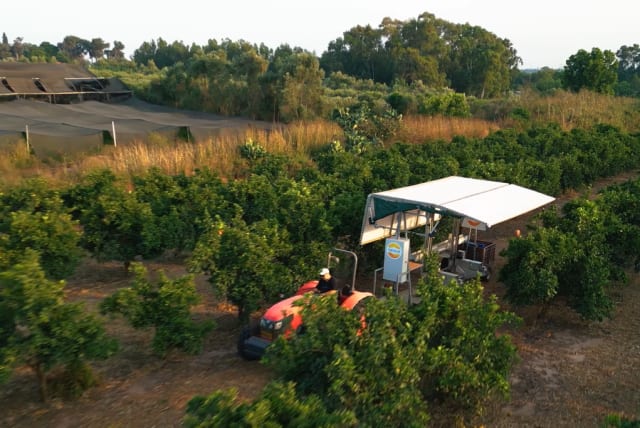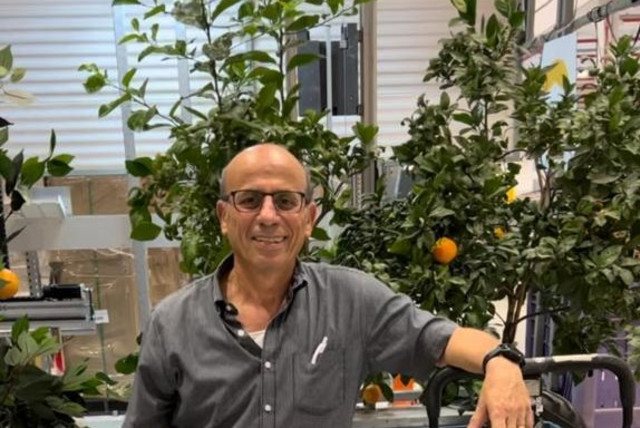Meet the man developing Israel's first AI-powered citrus picking robot

Nanovel’s flagship robot aims to revolutionize the citrus cultivation industry through the use of AI, big data, and robotics.
Israeli tech company Nanovel has been stealthily developing a game-changing solution for the challenges facing the citrus-harvesting industry. Leveraging a combination of robotics, computer vision, and Artificial Intelligence, the company has created a tractor-drawn citrus-picking robot that uses robotic arms to precisely grip, snip, and harvest ripe oranges from orchards.
In a market currently grappling with labor shortages and increasing demand for fresh produce, Nanovel’s solution aims to ensure a steady supply of citrus fruits while streamlining operations for growers.
The challenge at the heart of the robot’s creation lies in the labor-intensive process of picking citrus fruit. Reliant on the unpredictable availability of human workers, citrus picking is limited by sun-up to sun-down hours of work and the varying speed at which workers can operate.
While robotic harvesting methods exist for several crops already, the world of citrus has been left out to dry due to its challenging picking conditions – namely deep foliage and tall trees. Recognizing the lack of automated citrus-harvesting solutions in the industry, seasoned serial entrepreneur Itzik Mazor seized the opportunity to found Nanovel, personally funding the company for its first two years before securing additional support through seed funding.
“There are several companies that are working on similar automation, but we are going after a much more significant challenge,” he said. “Our robotic arm is very robust and can go very deep into the tree, about one or two meters into the foliage, and pick the fruit,” he noted, adding that thanks to the use of advanced computer vision and edge computing, the robot is able to “pick the one fruit you want, and not the one you don’t want to eat.”
The machine is essentially a large cart with an array of stiff, but very mobile, robotic arms. When hitched behind a tractor, Nanovel’s robot observes nearby trees, identifies ripe fruits and picks them accurately and gently, using a combination of vacuum suction and clamping blades in order to ensure the fruit is harvested with care.
Mazor is known for playing a pivotal role in establishing Israel’s chip industry and fostering strategic collaborations with tech giants like Samsung and Intel. His impressive track record includes co-founding Israel KLA and orchestrating a $53 million exit in 2015, when Jordan Valley Semiconductors was acquired by Bruker Global.
By leveraging his many collections throughout the hi-tech industry, Mazor has gathered a team that not only handles robotics with expertise, but also knows its way around advanced software.
“We extensively employ artificial intelligence to replace human eyes and brains in the assessment of fruit location and gripper navigation. The role of AI is critical to see where the fruits are, what size they are, and whether they’re ready to be picked. Additionally, it’s instrumental in determining the optimal order of picking when fruits are layered or intertwined. While a human can naturally adapt to such scenarios, a robot relies on its AI-driven decision-making process to prioritize which fruit to pick first and which to pick second,” Mazor explained, adding that AI is instrumental in determining the optimal order of picking when fruits are layered or intertwined.
Preserving quality
While a human can naturally adapt to such scenarios, a robot relies on its AI-driven decision-making process to prioritize which fruit to pick first and which to pick second. This careful coordination ensures a gentle and continuous flow of fruit, preserving quality from the moment of harvest through to the end product.
Mazor went on to note that AI implementation doesn’t stop at computer vision and on-the-ground operation; it also plays a more analytical role via the analysis of data. “Big data collection enables far more control of very huge agricultural areas. You can compare and keep track of what areas have a higher yield, what growing conditions make your fruit more or less juicy, and you can improve your quality and quantity in real-time,” he said.
At its headquarters in a business park at the foothills of the Carmel mountains, Nanovel has been steadily improving the design of its large robotic fruit picker, which is expected to launch next year. While current versions can support a maximum of four arms picking fruit simultaneously, the company has plans to eventually double that capacity, vastly increasing the potential productivity of any growers utilizing the technology.
As well, with orange picking solidly in its repertoire, the company has begun field trials in Israel focusing on the harvesting of green lemons. These early-season fruits serve as a proving ground for Nanovel’s AI-powered harvesting solution as it relates to the broad range of citrus varieties. Green lemons present a unique set of challenges due to their smaller size, varying degrees of ripeness, and delicate skin. Nanovel’s ability to successfully and efficiently pick these lemons demonstrates the precision and finesse of the technology.
By incorporating summer and fall citrus varieties into the technology’s repertoire, Nanovel is addressing a critical need in the industry. The agriculture sector typically experiences seasonality in crop harvesting, leading to fluctuating labor demands and supply-chain challenges. Nanovel’s solution seeks to mitigate these issues by offering year-round harvesting capabilities, thereby optimizing resource utilization for growers.
As the field trials progress and Nanovel fine-tunes its technology for a variety of citrus types, the company is positioning itself to be a game-changer in the citrus industry. The company’s dedication to addressing the practical needs of growers and its willingness to adapt and innovate demonstrate a commitment to creating a much more efficient and reliable future for citrus cultivation – one fruit at a time
"Advanced agricultural technology startups like Nanovel exemplify how robotics, artificial intelligence, and computer vision not only ensure precise fruit harvesting but also minimize waste," said Rafi Nevo, CEO of Agritech Israel and VP of Innovations at the Kibbutz Industry Association.
"In an innovative fusion of technology and agriculture, this pioneering venture is revolutionizing the AgriTech and farming landscape, solidifying Israel's reputation as an orange powerhouse," added Nevo. "Nanovel guarantees not only the exactitude of fruit harvesting but also heralds a more sustainable, prosperous, and productive tomorrow."
The AgriTech conference is founded by the AgriTech Association and produced by Klidoskop, in partnership with the Ministry of Agriculture, Ministry of Foreign Affairs, Ministry of Economy, the Export Institute, The Kibbutz Industry Association, The Israel Innovation Authority, The Federation of Israeli Chambers of Commerce, and Israel Water Works Association.
Jerusalem Post Store
`; document.getElementById("linkPremium").innerHTML = cont; var divWithLink = document.getElementById("premium-link"); if (divWithLink !== null && divWithLink !== 'undefined') { divWithLink.style.border = "solid 1px #cb0f3e"; divWithLink.style.textAlign = "center"; divWithLink.style.marginBottom = "15px"; divWithLink.style.marginTop = "15px"; divWithLink.style.width = "100%"; divWithLink.style.backgroundColor = "#122952"; divWithLink.style.color = "#ffffff"; divWithLink.style.lineHeight = "1.5"; } } (function (v, i) { });


